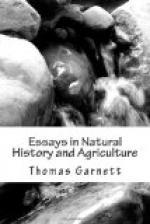I may perhaps be allowed to say what, in my opinion, would remedy this alarming destruction, particularly as no one hitherto seems to have devised an efficient preventive. I believe that in 1826 there was an Act of Parliament passed which either repealed or modified some of the old laws on the subject, and I have also understood that the good effects of this new law are already perceptible in Scotland, to which it is exclusively applied. There was a bill introduced into Parliament in 1825 which was intended to apply to the whole kingdom; but some of the clauses were so very objectionable, that if they had been carried they could not possibly have been enforced without stopping and ruining the manufactories which were carried on by water-power, and the bill was consequently abandoned. The first thing to be done is to give the proprietors on the upper part of the river such an interest in the fisheries as will make them anxious about the preservation of the fish in the spawning season; and to accomplish so desirable an object no one ought to fish or keep a net stretched across a river for more than twelve hours each day, or from sunrise to sunset; and every mill-owner ought to be compelled to facilitate the passage of the fish over his weir by every means consistent with the proper supply of water to his wheels. At present the fisheries at the mouths and lower parts of rivers so completely prevent the access of the fish to the upper parts, that unless there happen to be high floods, which prevent the fishermen below from keeping their nets in, the upper proprietors comparatively seldom see any until the season is at an end. The evidence before the House of Commons on this point is exceedingly amusing. One person thinks the upper proprietors have no right to expect any fish, as they have never paid any consideration for them when they bought their estates; another states that he pays L7,000 a year to the Duke of Gordon, and that if he is compelled to observe a weekly (not a daily) close time, he will lose that proportion of his rent; another observes the weekly close time, and opens a passage for the fish, but places a crocodile, painted in very glaring colours, in the gap to frighten them back again; another says he observes the weekly close time in his cruive fishing, but no one is allowed to inspect the cruives; another sends men to break down the stake nets in the estuary, which reach from high to low water-mark, and at the same time stretches a net completely across the river from March to August, so that a fish cannot pass without his permission. No wonder that fish are scarce in the upper parts of the river, when such samples of disinterestedness are manifested by the proprietors of the fisheries below. No wonder that the upper proprietors should be careless about the protection of fish from which they are not allowed to derive any benefit. No wonder that they should connive at, and even encourage, the shameful destruction of fish in close time, since that is the




